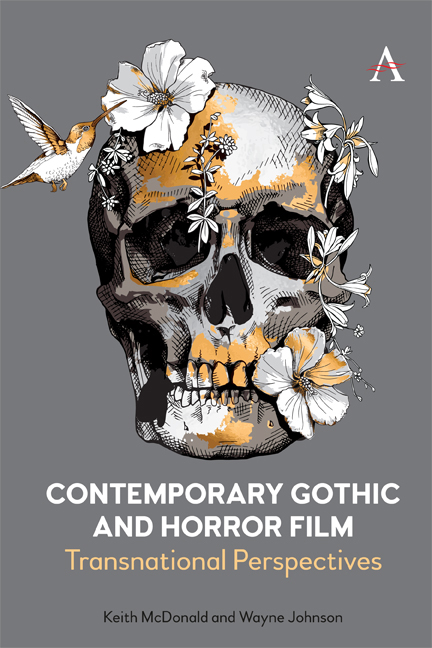Book contents
- Frontmatter
- Dedication
- Contents
- Acknowledgements
- Introduction
- 1 The Gothic Tradition Illuminated on Screen
- 2 Grief Encounters: Ghost Narratives
- 3 Folk in Hell: Rurality in Transition
- 4 Vampire Gothic as Post-Exotic Gloom
- 5 Shock and Awe: Cosmic Horror as Existential Crisis
- 6 De-Composmolitanism: Zombie Horror as Apocalypse
- Coda
- Bibliography
- Index
- Frontmatter
- Dedication
- Contents
- Acknowledgements
- Introduction
- 1 The Gothic Tradition Illuminated on Screen
- 2 Grief Encounters: Ghost Narratives
- 3 Folk in Hell: Rurality in Transition
- 4 Vampire Gothic as Post-Exotic Gloom
- 5 Shock and Awe: Cosmic Horror as Existential Crisis
- 6 De-Composmolitanism: Zombie Horror as Apocalypse
- Coda
- Bibliography
- Index
Summary
At the end of July 2020, the horror-centric web-platform Shudder released the British film Host (dir. Rob Savage, 2020), a ghost narrative which takes place in a Zoom meeting/ seance session, and which involves the invocation of an unwanted presence that, after one participant flippantly fabricates a scenario for laughs, uses this ‘mask’ to infiltrate the locked down group of friends and wreak havoc across the bandwidth using the web conferencing app as a gateway. Savage assures that the film evolved from inception to release in twelve weeks, with him directing it over the platform in order to create a film which has rightly been seen as a huge achievement and which maintains a sense of encroaching threat and insidious invasion. Host follows in a long line of horror films which use the limitations of a given scenario, both within and without the mode of production, in order to creatively deliver horror narratives and shunt the genre along. This includes the austerity of film production in Weimar Germany leading to inventive approaches to lighting and staging, which was part and parcel of German Expressionism, the visceral use of the hand-held camera in low-budget American horror in the 1970s and, of course, the emergence of the found-footage horror genre as docuversimilitudal form of horror in The Blair Witch Project , among many others. The film also adds to the nascent subgenre of web horror, which utilizes social media environments as a heterotopic-digispace of increasing familiarity and uncanny postcorporeal dislocation and disconnection.
What is perhaps even more interesting about Host is the ways in which the discourse of fear and uncertainty surrounding the Covid-19 outbreak and the subsequent social and self-quarantine restrictions that come from it are so adaptable and so relevant in revealing the robust nature of the threat to the corporeal, and its mainline connection to psychological and social trauma in which the safety of one's own home is revealed as an evaporating fallacy. The film centres on a group of friends who are mainly women (joined briefly by a jester/ mascot male friend figure, who is quickly removed by a wealthy bohemian girlfriend and then burned to death by the malevolent demon on his return).
- Type
- Chapter
- Information
- Contemporary Gothic and Horror FilmTransnational Perspectives, pp. 151 - 152Publisher: Anthem PressPrint publication year: 2021



